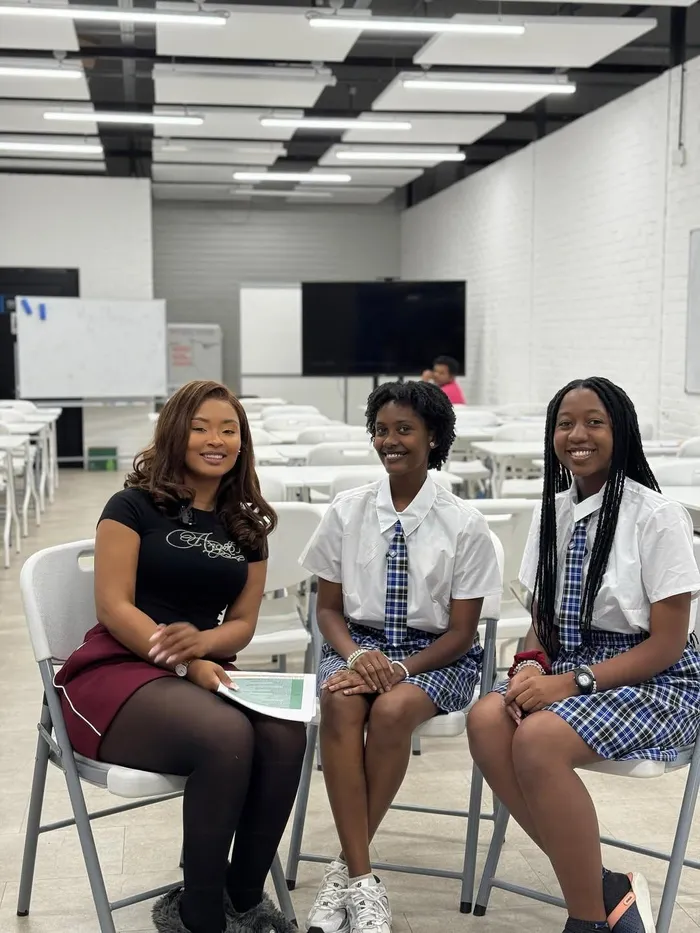Point of view: Alabuga Start, a cautionary tale for young job seekers

South African social media star and DJ, Cyan Boujee and the two young women, (L-R) Phionah Komuhangi and Melissa Omugabekazi from Uganda who are part of the 'Alabuga Start' programme, she interviewed for them for her video.
Image: Instagram/cyan.boujee24
This week, I was deeply disturbed by reports that social media influencers had earlier this year promoted a so-called job programme in Russia. Marketed as a golden ticket for young women aged 18 to 22, the “Alabuga Start” initiative promised international careers, free flights, housing, and Russian language classes. But beneath the glossy Instagram reels and TikTok testimonials lies a darker truth: the programme is now under investigation for human trafficking and labour rights violations.
Young South African women, many of whom were simply trying to escape the harsh realities of unemployment, might have been lured into what appears to be a factory job assembling military drones in Russia’s Tatarstan region. According to reports, once there, they reportedly faced long hours, withheld passports, surveillance, and conditions that stripped them of their dignity and autonomy.
Deputy Minister of Women, Youth, and Persons with disabilities, Steve Letsike, has raised the alarm about fake foreign job offers circulating on social media, specifically targeting young South African women. He says in some cases, these so-called Russian opportunities have led directly to human trafficking.
Nkosinathi Mahlangu, youth employment specialist at the Momentum Group Foundation, warns that: “promises of big salaries, travel incentives and accommodation often sound attractive, but they’re rarely genuine. With SA's sky-high unemployment rate, young people’s desperation for employment is being exploited,and the situation is further exacerbated thanks to the online channels now available to these scammers.”
This is not just a scandal. It’s a reflection of the desperation many young people feel in a country where the official unemployment rate has climbed to 33.2%, and youth unemployment sits at a staggering 46.1%. When hope is scarce, even the most questionable opportunity can seem like a lifeline.
Influencers who promoted this scheme must be held accountable. Their platforms are powerful, and with that comes responsibility. Promoting unverified recruitment campaigns, especially those targeting vulnerable youth, is reckless and dangerous. It’s not enough for influencers to delete posts and issue half-hearted apologies. When you have hundreds of thousands of followers, your words carry weight. South Africa’s Advertising Regulatory Board has clear guidelines about transparency and truthfulness in influencer marketing. If these guidelines are ignored, consequences must follow.
Job scams are becoming increasingly sophisticated, and it’s critical that young people know how to protect themselves. Offers that sound too good to be true often are. Be wary of vague job descriptions, pressure to act quickly, and companies that can’t be verified through official channels. Before accepting any overseas offer, check with the Department of International Relations and Cooperation (DIRCO) or the Department of Labour. A quick verification could save a life.
Parents and caregivers also have a vital role to play. Open conversations about online opportunities, digital literacy, and the risks of overseas recruitment are essential. Monitor the content your children consume, help them understand how to spot red flags, and encourage them to pursue local opportunities that offer real support and growth. We must create environments where young people feel seen, supported, and informed, not left to navigate these risks alone.
The Alabuga Start saga is a painful reminder that exploitation often wears the mask of opportunity. In a country battling unemployment and inequality, we must be vigilant. Influencers must act with integrity. Families must stay engaged. And as a society, we must ensure that hope is never weaponised against those who need it most.
* Maleke is the editor of Personal Finance.
PERSONAL FINANCE